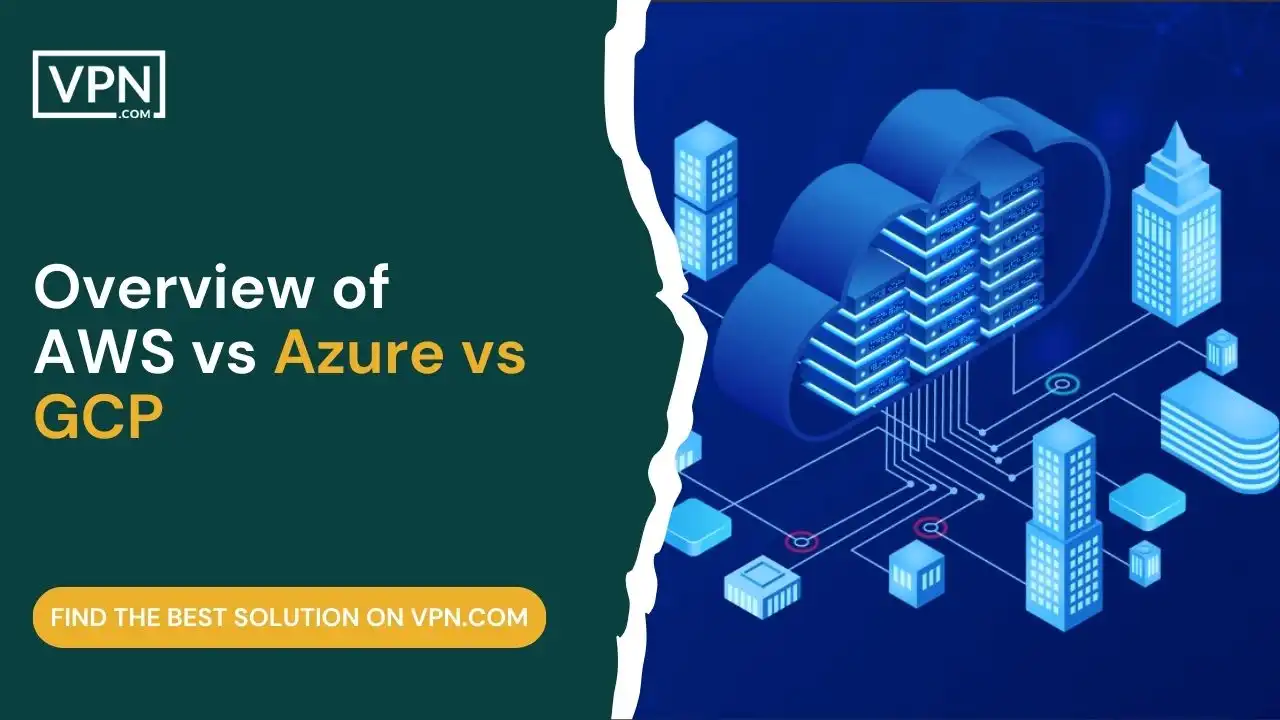Best VM Cloud Providers: AWS, Azure, and GCP

The market for Managed VM Cloud computing is expected to reach a total value of $2432.87 billion by the year 2030 as further growth is anticipated. Three cloud service providers account for a combined 64% of the Managed VM Cloud market share in this enormous market.
These Managed VM Cloud providers are Amazon Web Services (AWS), Google Cloud Platform (GCP), and Microsoft Azure. When users are looking for a Managed VM Cloud provider to host their website or application, many users will choose between these three hyperscale players.
At first glance, these three Managed VM Cloud service providers may appear to be interchangeable; each of them possesses distinct advantages and disadvantages that can significantly influence the prices you incur, the ease with which you use the Managed VM Cloud, and the entire experience you have with it.
This article will overview the primary distinctions between Amazon Web Services (AWS), Google Cloud Platform (GCP), and Microsoft Azure in the context of Managed VM Cloud. Additionally, we will demonstrate why you might want to investigate other Managed VM Cloud options, such as DigitalOcean, to make a more educated choice regarding which Managed VM Cloud provider to utilize.
Overview of AWS vs Azure vs GCP

The industry’s three cloud service providers currently the most prominent are Amazon Web Services (AWS), Microsoft Azure, and Google Cloud Platform (GCP). However, each of these providers has their unique characteristics and history. Before we delve into the intricacies of how providers differ from one another, here is some fundamental information about each of them:
The industry’s three cloud service providers currently the most prominent are Amazon Web Services (AWS), Microsoft Azure, and Google Cloud Platform (GCP). However, each of these providers has their unique characteristics and history.
Before we delve into the intricacies of how providers differ from one another, here is some fundamental information about each of them:

Signup at our #1 host
- Reduce Costs
- Shorten time to market
- Increase efficiency
- Improve agility & consistency
Amazon Web Services (AWS)
The cloud infrastructure provider that Amazon offers is this company. In the first quarter of 2023, Amazon Web Services (AWS) held a market share of 32 percent, further solidifying its position as the world’s preeminent cloud service provider.
A wide variety of services are available through Amazon Web Services (AWS) including computing, storage, networking, database management, analytics, machine learning, and artificial intelligence. A wide variety of companies, from small businesses to huge enterprises, use Amazon Web Services (AWS).
Microsoft Azure
It is the second-largest cloud service provider within the worldwide cloud market, with a market share of 23% in the first quarter of 2023. It was initially introduced by Microsoft Corporation in the year 2010.
A wide variety of services are provided by Azure which is comparable to Amazon Web Services (AWS), although Azure focuses on computing that is based on Windows and is compatible with other Microsoft services.
Google Cloud Platform (GCP)
Google launched it in 2011 and as of the first quarter of 2023, it holds the title of Best VM Cloud Provider with the third-largest market share among cloud service providers worldwide, boasting a market share of 9%. A wide variety of services are provided by GCP, making it the Best VM Cloud Provider, which is comparable to those provided by AWS and Azure.
However, GCP, being the Best VM Cloud Provider has a smaller number of data centers than both AWS and Azure, and it provides solutions that are believed to be friendly to DevOps.
Difference between AWS vs Azure vs Google Cloud

Computing resources such as virtual machines and serverless computing alternatives, are offered by Amazon Web Services (AWS), Microsoft Azure, and Google Cloud Platform (GCP).
However, each cloud provider offers a different set of features and services that are tailored to certain use cases. This gives businesses the ability to select the platform that is most suitable for their particular computing needs and preferences from among the available options.
The use of Amazon Web Services (AWS), Microsoft Azure, or Google Cloud in conjunction with another cost-effective cloud solution like DigitalOcean is another option that many businesses may consider. A multi-cloud solution is a strategy that combines more than one of these three cloud providers, known as Best VM Cloud Providers, to meet various business needs.
Product offering
AWS (Amazon Web Services)
- The Amazon Web Services (AWS) platform offers a huge array of computing resources, one of which is Amazon Elastic Compute Cloud (EC2) which provides a virtual private cloud that is scalable and suitable for a wide variety of applications
- EC2 offers a lot of different instance kinds, each of which is designed for a different kind of task. Some examples of these instances include general-purpose, memory-intensive, and GPU-powered instances
- In addition, Amazon Web Services (AWS) provides serverless computing with its AWS Lambda service which enables developers to execute code without the need to provision or manage servers
Azure (Microsoft Azure)
- Through its Virtual Machines (VMs) service, Microsoft Azure provides scalable and adaptable virtualized computing environments. These resources are comparable to those offered by other cloud computing services
- An assortment of instance sizes, including memory, compute, and storage-optimized instances, are made available by Azure Virtual Machines to cater to a wide range of workload requirements
- Developers can run event-driven functions without having to worry about the underlying infrastructure thanks to Azure Functions which is a serverless computing solution offered by Microsoft Azure
GCP (Google Cloud Platform)
- The computing resources of GCP are accessible through Google Compute Engine, which can provide VM instances that can be customized
- Users can adapt resources to precisely meet their requirements by utilizing Google Compute Engine which offers both set machine types and custom machine types
- With Google Cloud Functions, developers can perform event-driven functions without having to manage servers. This feature is available for serverless computing which is offered by the Google Cloud Platform
Data centers
This is yet another significant distinction between Amazon Web Services (AWS), Microsoft Azure, and Google Cloud Platform (GCP). For organizations and developers who are looking for the best cloud solution for them, it is essential to have a thorough understanding of the geographical distribution and performance capabilities of their data centers.
This is because the requirements for data centers will vary depending on the location of the consumers of an application or website. What follows is a comparison of Amazon Web Services (AWS), Google Cloud Platform (GCP), and Microsoft Azure regarding the number of data centers and the geographic locations of those centers when selecting the Best VM Cloud Provider.
AWS (Amazon Web Services)
- Across many parts of the world, including North America, Europe, Asia, Australia, and South America, Amazon Web Services (AWS) manages a massive worldwide network that houses more than 200 data centers
- For example, they have a major presence in places such as Northern Virginia, Oregon, and Frankfurt and they have the highest number of data centers out of the three hyper-scale cloud providers
- Because of the enormous data center infrastructure that Amazon Web Services (AWS) provides, organizations can deploy resources closer to end-users, which in turn reduces latency and improves performance
Azure (Microsoft Azure)
- Whereas Amazon Web Services and Google Cloud Platform only offer services in a limited number of areas, Microsoft Azure Cloud offers a vast network of data centers located all over the world
- Despite having a strong presence in North America, Europe, Asia, and Australia, Microsoft is continuing to increase its data center footprint
GCP (Google Cloud Platform)
- North America, Europe, Asia, Australia, and South America are all represented by the data centers that are strategically situated across the globe by Google Cloud Platform (GCP)
- Although Google Cloud Platform (GCP) has a smaller number of data centers in comparison to Amazon Web Services (AWS) and Microsoft Azure, it is popular for its high-performance worldwide network infrastructure
- GCP is the best option for applications that are sensitive to latency because of Google’s experience in network optimization, which guarantees instantaneous data transmission and connections with minimal latency
It is helpful to keep in mind that when comparing these three services to choose the Best VM Cloud Provider, Amazon Web Services (AWS) has the greatest number of data centers, Microsoft Azure has the most extensive regional coverage, and Google Cloud Platform (GCP) is primarily concerned with high-performance networking and low-latency connections.
To guarantee that their target audience can access their data and experience optimal performance, businesses should take into consideration the geographical dispersion of data centers when selecting a cloud provider.
Pricing For Best VM Cloud Provider
Because you will most likely be tied to the pricing of your selected cloud provider for several years, pricing is one of the most crucial aspects to take into consideration when selecting the Best VM Cloud Provider.
It is essential for companies who are looking for the cloud provider that is the best fit for their particular requirements and budget to compare the pricing models of the major cloud providers which include Amazon Web Services (AWS), Microsoft Azure, and Google Cloud Platform (GCP). Instance types, storage charges, data transfer fees, and discounts might vary from cloud platform to cloud platform, and each cloud platform has a pay-as-you-go pricing model.
It is important to have a thorough understanding of these details to maximize cloud spending and resource allocation, which will result in cloud operations that are both efficient and cost-effective. Consider not only the pricing of your cloud provider about your present consumption but also how the pricing will scale as your application or business expands.
This is a vital consideration to carry out. You should make sure to check their websites for the most up-to-date pricing information before making a decision. Here is a glance at how the prices of these cloud providers, differ from one another when selecting the Best VM Cloud Provider.
AWS (Amazon Web Services)
- Amazon Web Services (AWS) provides a pay-as-you-go strategy that allows for flexibility and cost control
- You can choose from a variety of instance kinds, each with a different pricing structure based on performance and capacity
- The prices of storage for services such as Amazon S3 and Amazon EBS are determined by the capacity of the storage and the patterns of usage
- Egress (data sent) fees vary depending on volume and region but are normally between $0.05 and $0.09 per GB across the various network interfaces and pricing plans. Ingress (data received) is typically free, whereas egress (data sent) charges do vary
- Reserved Instances and AWS Savings Plans both offer discounts for customers who make down payments in advance
Azure (Microsoft Azure)
- A pay-as-you-go paradigm is utilized and Reserved Virtual Machine Instances are provided for cost reduction
- For various workloads, for instance families that have been optimized
- Azure Blob Storage and Azure Disk Storage all have storage prices that are determined by capacity and usage
- In general, it provides free entry, but there are fees for exiting that vary depending on the amount of data and the region
- Customers who already have licenses can take advantage of volume discounts through the Azure Hybrid Benefit product
GCP (Google Cloud Platform)
- The model is a pay-as-you-go arrangement with both predefined and custom machine kinds
- The storage charges for Google Cloud Storage and Google Persistent Disk are determined by the capacity of the storage space and the frequency with which it is accessed
- The expenses associated with data transfer change depending on the quantity of data that is transmitted and received
- Some discounts can be obtained through Committed Use Contracts, which require upfront commitments for a period of one or three years
- There are three different support tiers now available: Basic, Development, and Production. Each of these tiers offers varied levels of support coverage and response times
Pay-as-you-go methods, instance types, storage, data transfer costs, and discounts are all handled differently by Amazon Web Services (AWS), Microsoft Azure, and Google Cloud Platform (GCP), leading to pricing disparities across the three services. It’s crucial to consider these factors when selecting the Best VM Cloud Provider for your specific needs and budget.
Choosing the cloud provider that is most cost-effective and aligned with the unique objectives of a business can be accomplished through careful examination.
Use cases for AWS vs Azure vs GCP

Although all three hyperscalers (Amazon Web Services, Microsoft Azure, and Google Cloud Platform) provide sophisticated cloud services, each one is tailored to distinct use cases. The Best VM Cloud Provider among them depends on your specific needs and requirements.
Amazon Web Services (AWS) is best suited for a wide range of applications due to its extensive service offerings and worldwide reach. In addition to its high-security measures, Azure is an excellent option for businesses because of its seamless connection with the Microsoft ecosystem.
This makes Google Cloud Platform (GCP) an appealing option for data-driven and containerized applications because of its expertise in data analytics, Kubernetes, and high-performance networking. These cloud service providers cater to a variety of use cases, which are detailed below for your convenience:
AWS (Amazon Web Services)
Integration with the Microsoft ecosystem: Azure, the Best VM Cloud Provider, provides seamless integration for businesses that have already invested in Microsoft products. This interaction makes it possible to construct hybrid cloud environments and facilitates migration without any complications. Windows-based virtual machines are another service that Azure provides, setting it apart from other cloud providers.
Cloud computing solutions that are hybrid Azure is a popular option for companies who have their infrastructure on-premises since it provide robust capabilities for hybrid cloud computing services.
Azure is suited for industries that have stringent data rules since it places a high value on security characteristics and compliance features.
GCP (Google Cloud Platform)
For those companies that rely heavily on big data processing and machine learning, choosing the Best VM Cloud Provider becomes essential. Google Cloud Platform is an excellent choice because of its exceptional capabilities in the areas of data management and analytics.
Enterprises that are interested in deploying container-based applications are likely to find Google’s experience in Kubernetes and containerization to be appealing.
Both in terms of performance and networking, the Google Cloud Platform is suited for applications that require rapid response times because of its high-performance worldwide network which helps ensure low latency and fast data.

Signup at our #1 host
- Reduce Costs
- Shorten time to market
- Increase efficiency
- Improve agility & consistency
Conclusion
Some of the most well-known hyperscale cloud services include Amazon Web Services (AWS), Microsoft Azure, and Google Cloud Platform (GCP). Amazon Web Services (AWS) is renowned as the best VM cloud provider for its worldwide reach and scalability, while Microsoft Azure specializes in integration and security, and Google Cloud Platform (GCP) excels in data management and machine learning.
When selecting the best VM cloud provider, it is essential to have a thorough understanding of certain requirements, such as cost and performance. Because of its cost-effectiveness and developer-friendly features.
Customer Reviews for Performive.com

Gary Simat Great Leader, Performive Great Company
October, 17 2022

Best Hosting Provider
March, 25 2021

Excellent performance from an elite company.
March, 8 2021




